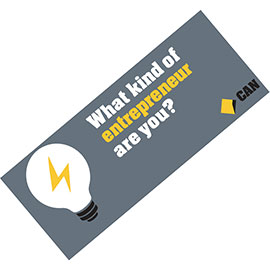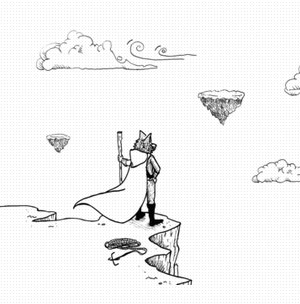Will the real Aussie entrepreneur please stand up? Not so quick. Or, not so easy, perhaps.
Commonwealth Bank, armed with the insights of a psychologist and entrepreneurs themselves, embarked on a quest to find an answer to that question. Now, it even believes it might have decoded the Aussie entrepreneur’s DNA.
So what have we got here?
The Aussie entrepreneur, apparently, comes in seven types. Of them, the two most dominant are risk takers (24%) and top competitors (20%), traits that might equally fit AFL footballers.
But, obviously, there is more that distinguishes the entrepreneur from the brawny athletes. The five other types and their probable relative percentages in the population of entrepreneurs are as follows:
- Achiever (15%);
- Individualist (15%);
- Innovator (10%);
- Learner (8%); and
- Self-starter (8%).
Wait, there is still more that defines the entrepreneur. Or, perhaps, the missing trait that does.
“While it’s evident there are people out there prepared to take a risk and compete, there are fewer reporting strengths in learning from their experiences and stepping up to bring new ideas to the market,” says Kirsty Bucknell, the organisational psychologist who designed the psychometric test used in the survey. “Our research shows that often these less common strengths are the ones that contribute most to an entrepreneurial mindset.”
Michael Cant, Commonwealth Bank’s executive general manager of Corporate Financial Services, says it’s important for entrepreneurs to recognise their core strengths in order to optimise their business skills.
What is your entrepreneurial type?
“It’s clear from our study many entrepreneurs share similar qualities, however, there is always one trait that shines more brightly and it’s this trait entrepreneurs need to be most aware of to ensure they are harnessing their business potential,” he said.
Among other things, the study found, unsurprisingly, that family and parents make a profound influence on entrepreneurs, as do individual motivations, personality, expertise and ideas. Among external factors, financial backing, market dynamics and access to business networks were rated the most important.
The psychometric test was based on the broad topic, ‘What kind of entrepreneur are you?’ It was administered on 475 Australian business owners and senior business decision-makers, each of whose firms had an annual turnover of under $50 million. Bucknell was assisted in the study by Red Engine and Pure Profile.
Based on which among the seven distinguishing traits is dominant in an entrepreneur, the study categorised and defines them as follows:
Individualist – they make their own rules, their own decisions and don’t like following orders, preferring the freedom to seek out and explore their own unique methods and approaches in business.
Learner – they’re always looking to grow and independently build their knowledge from experiences such as business successes and failures, and are most engaged when they’re learning.
Achiever – they like to score goals and set the bar high with challenging tasks and then work exceptionally hard to ensure they get there.
Competitor – they fight to be the best and aren’t shy about wanting to win or going up against opponents in business.
Innovator – they love novelty and creativity, they actively seek out and gravitate towards new ideas, fresh approaches and different methods, frequently merging concepts and always testing the boundaries.
Risk-taker – they aren’t afraid to take the plunge with business decisions others might consider precarious or uncertain.
Self-starter – they are proactive and persistent, they’re full of initiative and have no problems getting things going in business or thinking ahead.
If you want to recognise your own type, you can still take the ‘What kind of entrepreneur are you?’ test here.






![Do you have happy staff? 5 ways to improve performance [FREE DOWNLOAD]](https://anthillonline.com/wp-content/uploads/2016/06/chris-smith-cheatsheet-04c.pdf-Box-2016-06-30-20-45-20-300x194.png)
![Strategic Alliances with Simone Novello [FREE INFOGRAPHIC]](https://anthillonline.com/wp-content/uploads/2015/08/Capture6-100x75.jpg)
![How to zig when everyone else is zagging, with Julio De Laffitte [CHEAT SHEET]](https://anthillonline.com/wp-content/uploads/2015/08/Capture2-100x75.jpg)
![The Ultimate Social Media Almanac with James Tuckerman [Cheat Sheet]](https://anthillonline.com/wp-content/uploads/2015/11/Screen-Shot-2015-11-26-at-11.24.55-100x75.png)
![How to build a retail empire with James Webber [FREE REPORT]](https://anthillonline.com/wp-content/uploads/2015/06/james-webber-instagram-memes-01-100x75.jpg)
![How to expand into New Markets with Elsita Meyer-Brandt [CHEAT SHEET]](https://anthillonline.com/wp-content/uploads/2015/07/Screen-Shot-2015-11-26-at-15.52.30-100x75.png)


![This is the kind of plan everyone needs to create [VIDEO]](https://anthillonline.com/wp-content/uploads/2015/04/WIndow-300x350.jpg)
![How do you create new ideas? Play this game. Seriously [VIDEO]](https://anthillonline.com/wp-content/uploads/2015/04/IdeasGame-300x350.jpg)
![Having a rough week? Watch this [VIDEO]](https://anthillonline.com/wp-content/uploads/2013/12/here-is-a-robot1-300x350.jpg)
![The Ultimate Social Media Almanac with James Tuckerman [Cheat Sheet]](https://anthillonline.com/wp-content/uploads/2015/11/Screen-Shot-2015-11-26-at-11.24.55-300x194.png)
![Inbound Marketing Reloaded with James Tuckerman [FREE REPORT]](https://anthillonline.com/wp-content/uploads/2015/07/cover-3d-347h-x-253w--100x75.png)
![5 Ways to get more out of your coffee shop meetings with Antony Gaddie [CHEAT SHEET]](https://anthillonline.com/wp-content/uploads/2015/07/gaddie-3d-cover-01--100x75.png)
![New Zealand’s Xero eyes US IPO, further disruption as subscribers increase [INFOGRAPHIC]](https://anthillonline.com/wp-content/uploads/2014/07/sruuuuujana-212x194.png)
![Ever wonder if your ‘content marketing’ is really just crap? You gotta see this! [INFOGRAPHIC]](https://anthillonline.com/wp-content/uploads/2014/08/content-100x75.jpg)
![7 Business Lessons From Game of Thrones [INFOGRAPHIC]](https://anthillonline.com/wp-content/uploads/2014/10/infographic-games-of-thrones-041-100x75.jpg)
![How to build your own Media Empire… In seven steps with Nathan Chan [INFOGRAPHIC]](https://anthillonline.com/wp-content/uploads/2014/10/Nathan-Chan-Infographic-e1413419529176-100x75.jpg)
![5 Business Lessons From Tinder [INFOGRAPHIC]](https://anthillonline.com/wp-content/uploads/2014/10/Tinder-Elegant-Infographic-100x75.jpg)



